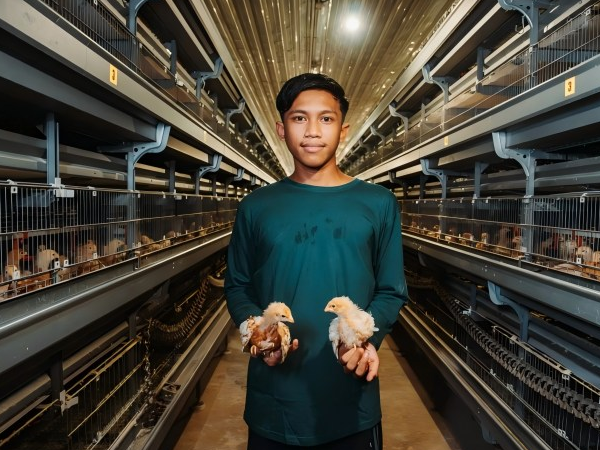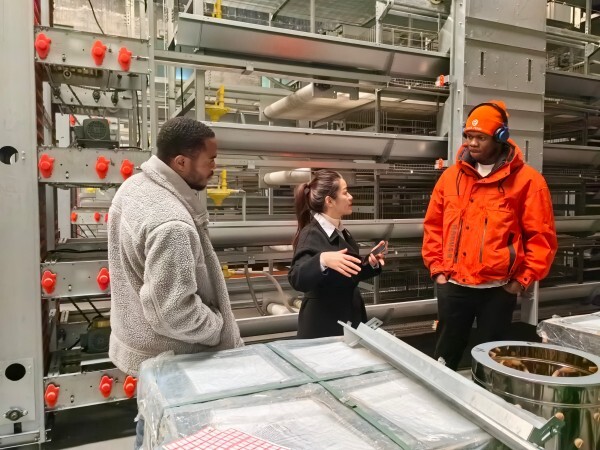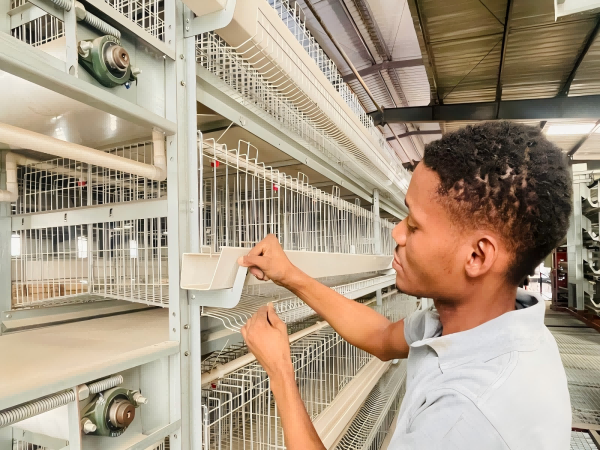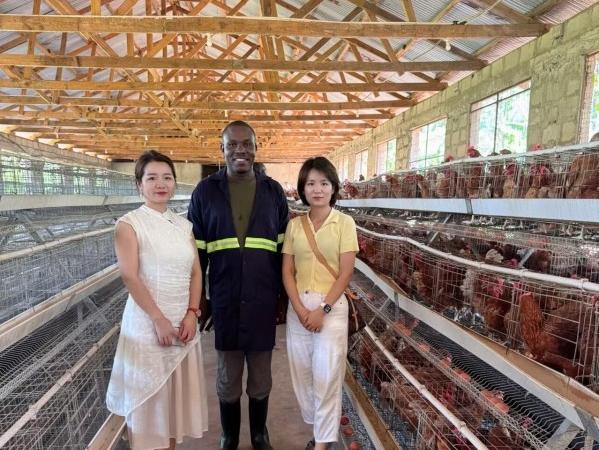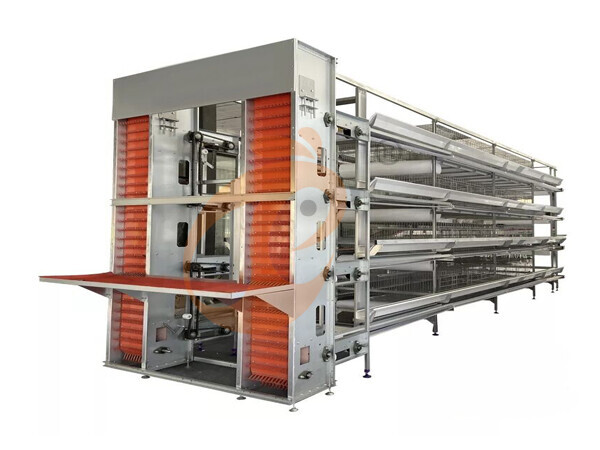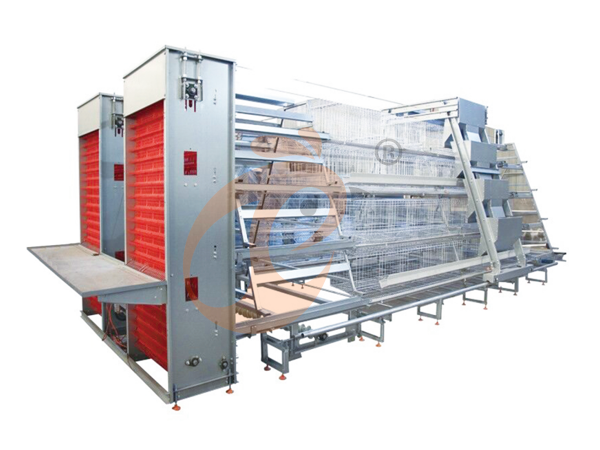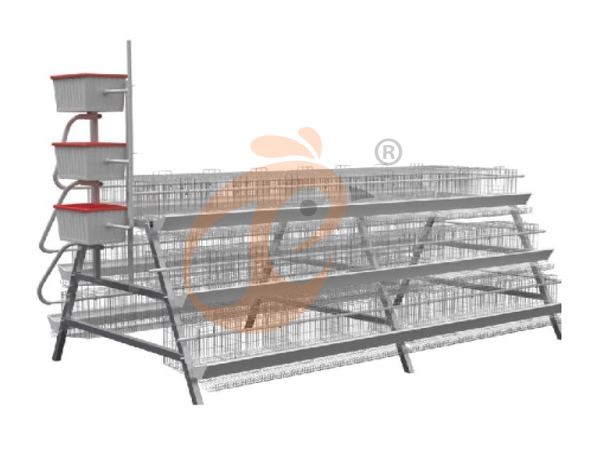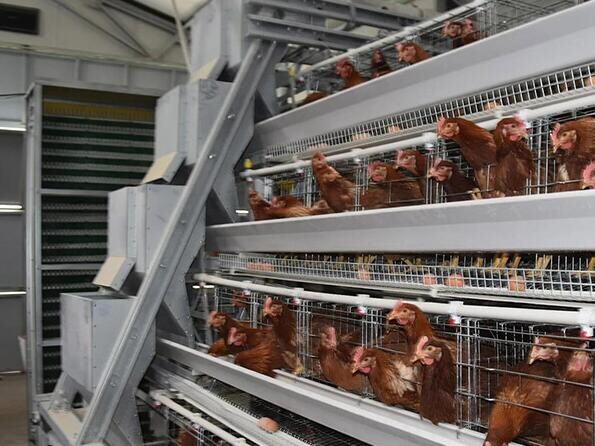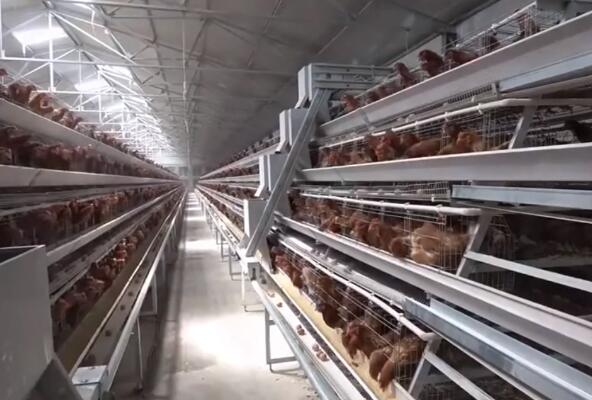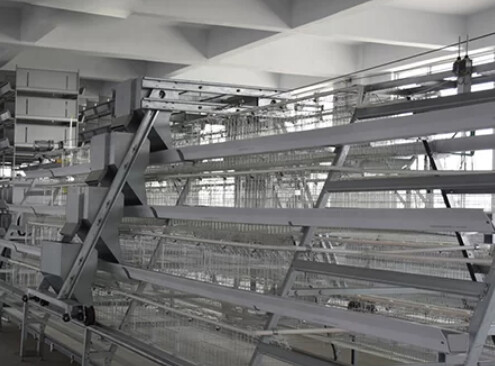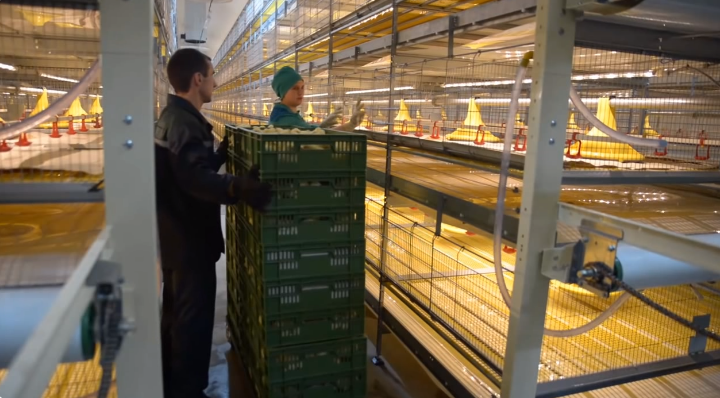
BLOG
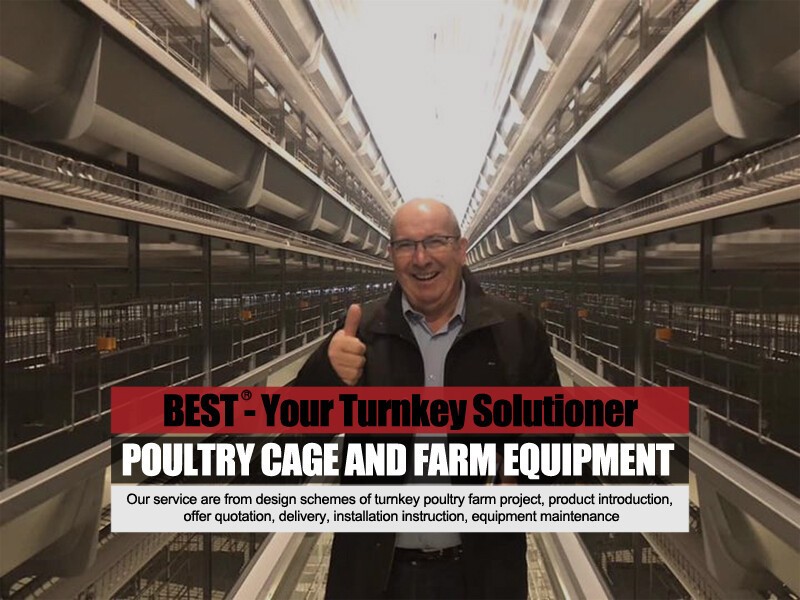
Basic information
A 120 broiler battery cage system is designed to optimize poultry farming by automating essential functions and maximizing production efficiency. By implementing such systems, farmers can achieve consistent growth, higher yields, and lower operational costs. However, the initial investment for setting up such a system can be significant, and proper maintenance and management are key to ensuring its longevity and effectiveness. This approach is well-suited for large-scale commercial poultry farming, where maximizing space and efficiency is crucial for success
A 120-broiler farm utilizing battery chicken cages represents a highly efficient and automated poultry farming system. Battery cage systems are designed to maximize space utilization and feed conversion efficiency while maintaining a clean and controlled environment for the birds
This setup is particularly beneficial for commercial operations looking to increase production output while minimizing manual labor, for a farm raising 120 broilers using battery chicken cages, specific equipment is needed to optimize space efficiency, feed distribution, water supply, and waste management
For a 120-broiler farm using battery cages, the key equipment includes automated systems for feeding, watering, climate control, waste management, and monitoring. This setup reduces manual labor, improves efficiency, and helps maintain the health and productivity of the birds. While the initial investment in such systems can be significant, the long-term savings in labor, feed, and health management make it a highly cost-effective solution for commercial poultry farming
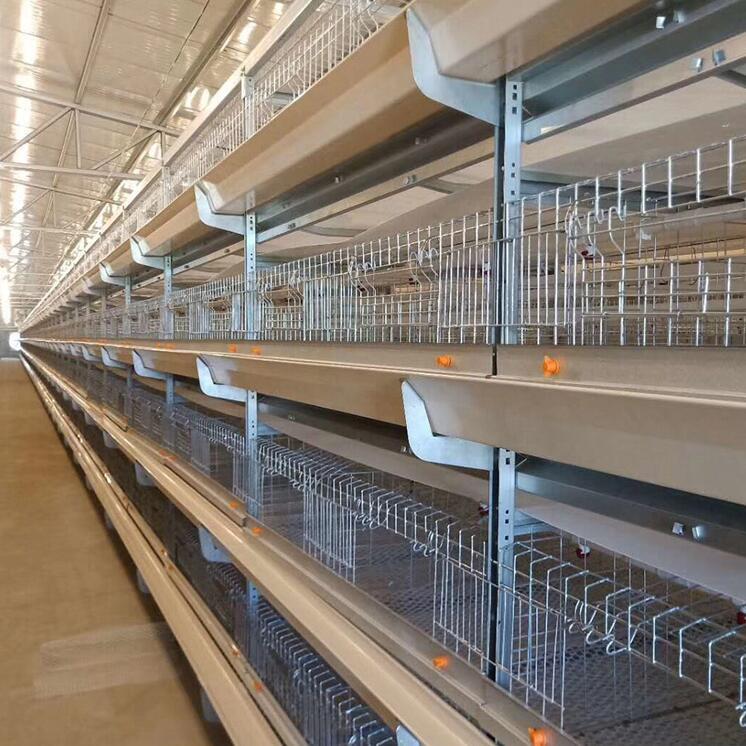
Key components of a 120 broiler battery cage system
1. Battery cages: Multi-tiered cages designed to house broilers in a compact, vertical arrangement. These cages provide optimal living space, with slatted floors for easy waste removal and good ventilation
2. Automatic feeding system: A network of feeders that automatically distribute feed to each cage, ensuring precise and consistent feed supply to the birds, reducing waste and improving feed efficiency
3. Nipple drinker system: Automated nipple drinkers connected to a central water supply. This system provides fresh water to broilers on demand, ensuring hydration without wastage
4. Climate control system: Includes ventilation fans, cooling pads, and heaters to regulate temperature, humidity, and airflow. It maintains a comfortable environment for the birds, reducing heat stress and promoting healthy growth
5. Manure removal system: Automated systems like manure belts or conveyor belts that collect and transport waste from under the cages to a central collection area, ensuring cleanliness and hygiene in the poultry house
6. Lighting system: Automated lighting systems that regulate the number of light hours per day, influencing broiler growth cycles, productivity, and overall health
7. Health monitoring sensors: Sensors to monitor factors such as bird behavior, weight, and overall health. This data helps detect issues early, ensuring better flock management
8. Control panel: A central control unit that integrates all automated systems, allowing farmers to monitor and adjust temperature, feeding, watering, and ventilation remotely for efficient farm management
To us it is quality that matters, not only quantity. We always have a workable solution for any possible problem, visiting our product list to learn more, click the words directly
1. Automatic or semiautomatic broiler, pullet and egg laying chicken cage system
2. Necessary poultry farm equipment
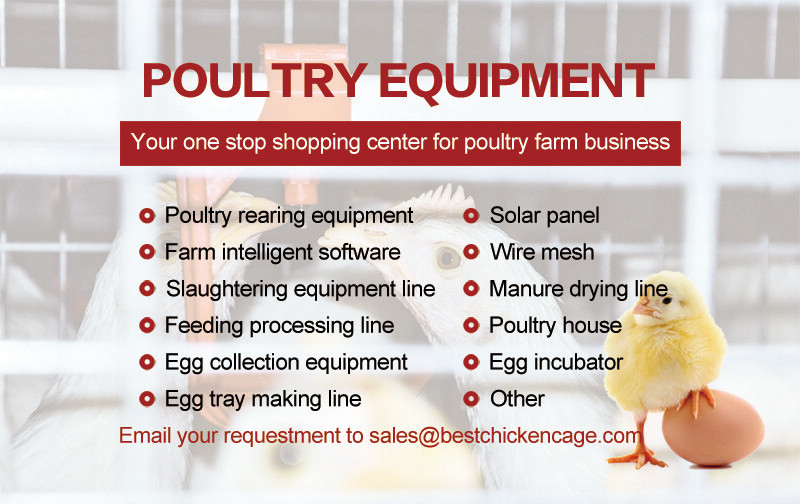
The designer, manufacturer and supplier of your poultry farm turnkey project, leave message on our website now to getting your own solution and enquiry for your poultry farm
Company video
Precautions for 120 broiler battery cage system
1. Regular cleaning and maintenance: Periodically clean the cages, feeders, drinkers, and waste removal systems to prevent the build-up of bacteria and pathogens
2. Proper temperature control: Maintain optimal temperature and humidity levels. Avoid extreme fluctuations in temperature, as it can cause stress and affect broiler growth. Use temperature sensors to monitor conditions closely
3. Adequate ventilation: Ensure proper airflow to prevent air stagnation and the buildup of harmful gases (e.g., ammonia). Install and regularly check ventilation fans to ensure good air circulation in the poultry house
4. Biosecurity measures: Implement strict biosecurity protocols to prevent diseases from entering the farm. Limit access to the poultry house, disinfect equipment and footwear, and monitor the health of birds regularly
5. Feeding and watering system checks: Ensure that feeders and nipple drinkers are working correctly to provide consistent food and water supply. Clogged systems can lead to malnutrition or dehydration
6. Avoid overcrowding: Ensure that the cages are not overcrowded, as this can lead to stress, poor growth, and an increased risk of disease. Follow recommended space guidelines for each bird
7. Monitor bird behavior: Regularly monitor the health and behavior of the broilers using sensors or visual inspection. Early detection of health issues allows for quick intervention and reduces the risk of spreading diseases
8. Waste management: Regularly inspect the manure removal system to ensure it is functioning properly
Advantages of a 120 broiler battery cage system
1. Space efficiency: The vertical stacking of cages maximizes the use of space, allowing a high-density housing setup for 120 broilers in a smaller area, which is especially beneficial for farms with limited space
2. Labor reduction: Automated systems for feeding, watering, waste removal, and climate control significantly reduce the need for manual labor, cutting labor costs and increasing operational efficiency
3. Improved feed conversion: The automatic feeding system ensures precise portion control, reducing feed waste and improving feed conversion rates, which leads to more efficient growth of broilers
4. Consistent environment: Climate control systems maintain stable temperature, humidity, and airflow, providing a comfortable and consistent environment that promotes better growth rates and overall bird health
5. Enhanced bird health and welfare: Regular access to clean water and consistent feed, along with reduced manual handling, minimizes stress and disease risk, improving the overall health and welfare of the birds
6. Hygiene and waste management: The automated waste removal system ensures a cleaner environment by efficiently removing manure, reducing the risk of infections and maintaining proper hygiene in the poultry house
7. Increased productivity: Automation and efficiency lead to higher production rates with less human intervention, enabling farms to scale operations while maintaining high standards of quality and performance
8. Real-time monitoring and control: Integrated monitoring systems allow farmers to track bird behavior, temperature, water, and feed consumption in real-time, enabling quick adjustments to improve flock performance
9. Sustainability: Automated systems use resources like feed and water more efficiently, reducing waste and contributing to more sustainable and environmentally-friendly poultry farming practices
10. Long-term cost savings: While the initial investment may be higher, the long-term benefits of reduced labor costs, better feed efficiency, and optimized bird health contribute to overall cost savings and a faster return on investment (roi)
Our services
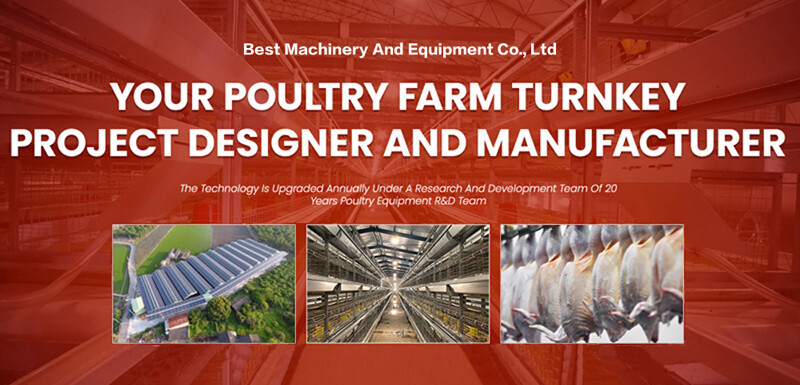
1. Our experts offer consultancy services to help optimize your poultry farming practices, improve efficiency, and meet animal welfare and regulatory standards
2. We provide regular maintenance and after-sales support, ensuring that systems and equipment continue to function optimally throughout their lifespan
3. We help farms adopt sustainable farming practices, such as energy-efficient equipment and waste management systems, to reduce environmental impact and lower operational costs.
4. We offer global shipping and delivery services, ensuring our equipment reaches poultry farms worldwide, no matter the location
5. Our products include eco-friendly features such as efficient waste management systems and energy-saving technologies to promote sustainable farming practices
6. Our modular designs allow for easy expansion of your poultry farm, ensuring the systems grow alongside your production needs
Frequently asked questions
Q: What equipment is included in a typical battery cage system?
A: A typical system includes battery cages, automatic feeders, nipple drinkers, climate control systems (fans, cooling pads, heaters), waste management systems, automated lighting, and health monitoring sensors
Q: Is it difficult to maintain the broiler battery cage system?
A: Maintenance is relatively easy, but it’s important to regularly check and clean feeders, drinkers, ventilation systems, and waste removal equipment. Periodic inspections ensure everything is working properly, and routine maintenance extends the life of the equipment
Q: What is the lifespan of a broiler battery cage system?
A: With proper maintenance, a broiler battery cage system can last 10 to 15 years. The system’s lifespan depends on the quality of materials, frequency of use, and regular maintenance
PRODUCTS RECOMMENDED
MESSAGE
NEWS
 Chicken cage system are important tools for managing poultry farming operations and provide an efficient and hygienic environment for hens and roostersRead More
Chicken cage system are important tools for managing poultry farming operations and provide an efficient and hygienic environment for hens and roostersRead More Modern chicken cage systems incorporate automated feeding and watering and egg collection to optimize poultry operationsRead More
Modern chicken cage systems incorporate automated feeding and watering and egg collection to optimize poultry operationsRead More The helpful information of cage structure of layer chicken cage poultry farming cage in chicken farm projectRead More
The helpful information of cage structure of layer chicken cage poultry farming cage in chicken farm projectRead More The helpful information and maintain advantages of cage free versus battery cage system eggsRead More
The helpful information and maintain advantages of cage free versus battery cage system eggsRead More

